Bates in the News: June 28, 2018
Amy Bass ’92
Netflix options ‘Friday Night Lights’-like soccer story ‘One Goal’ — The Hollywood Reporter
The Hollywood Reporter and the Portland Press Herald reported that Netflix has bought the rights to One Goal by Amy Bass ’92.
The book, whose publication in February gained national attention, tells the story of the Lewiston High School boys soccer team, comprising mostly immigrants from Somalia and other African countries, that won the 2015 Maine state championship.
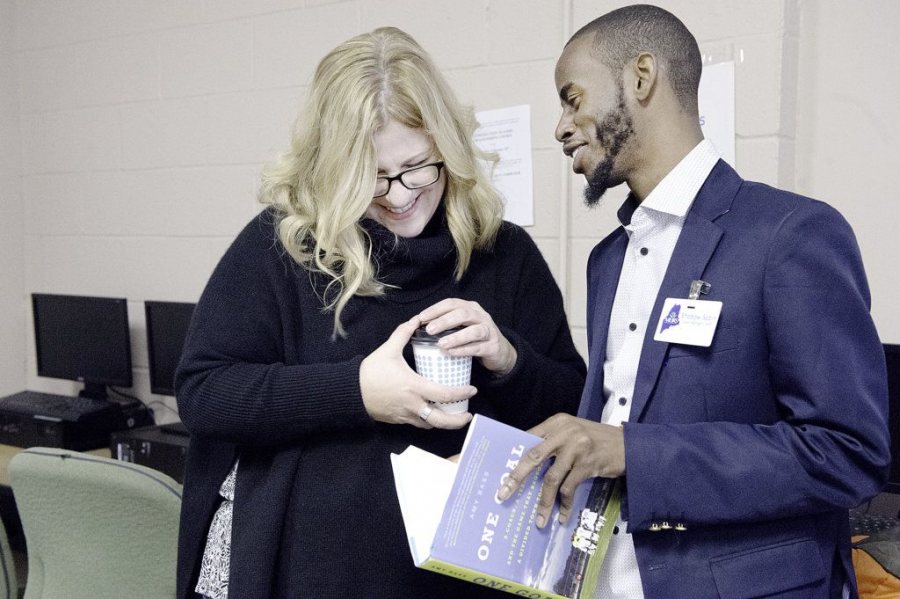
During a visit to Maine Immigrant and Refugee Services in Lewiston in March, Amy Bass ’92 talks to Shobow Saban, a Lewiston High School graduate and key figure in her book, One Goal. (Daryn Slover/Sun Journal)
Bass cautioned that a book’s optioning does not necessarily mean it will be produced — but she said the story of the LHS soccer team is an important one to tell.
“It’s very much about Lewiston being a microcosm of bigger things happening right now,” she told the Press Herald. “Communities that come together don’t always stay together. It takes a lot of work.”
Eben Sypitkowski ’05
Baxter State Park, home of Mount Katahdin, gets new director — Portland Press Herald
The Portland Press Herald, the Bangor Daily News, and WABI-TV reported that Eben Sypitkowski ’05 will become the newest director of Baxter State Park, which contains Mount Katahdin, Maine’s highest peak.
An environmental studies major at Bates who studied coastal bloodworm digging for his honors thesis, Sypitkowski is currently the park’s resource manager, and he told WABI that he hopes to continue the vision of Gov. Percival P. Baxter, who donated the land for the park in the early 1930s.
“This is a place to turn off your cellphone and let your relationship with nature be contemplative and not structured by commercial interests,” he said. “This is a place to step out of our connected world, and reconnect with yourself and nature.”
Bill Hiss ’66
Large study finds colleges that go test-optional become more diverse and maintain academic quality — Inside Higher Ed
Inside Higher Ed and other news media reported the findings of a major study of optional SAT policies co-authored by Bill Hiss ’66 and Valerie Franks ’98.
One of the study’s major conclusions is that SAT-optional policies can lead to an increase in underrepresented students in both the applicant pool and the first-year class.
The study also finds that, once in college, students who did not submit test scores posted lower grades initially, “but they ended up highly successful, graduating at equivalent rates or — at some institutions — slightly higher rates than did those who submitted test scores,” according to Inside Higher Ed. “This, the report says, is ‘the ultimate proof of success.’”
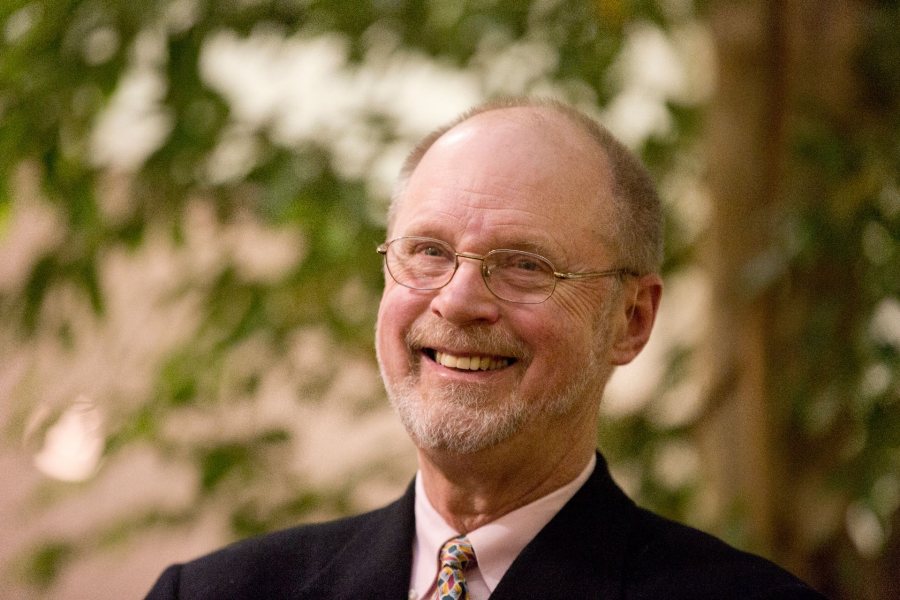
As dean of admissions from 1978 to 2000, Bill Hiss ’66 spearheaded the college’s test-optional policy. Since then, he’s tracked the policy’s effect at Bates and nationally. (Phyllis Graber Jensen/Bates College)
The study is the second major SAT-outcome study for which Hiss and Franks have been key players.
Hiss, who was Bates’ dean of admissions from 1978 to 2000, spearheaded the college’s move to test-optionality in the 1980s. He and Franks have studied the issue extensively as more and more schools — most recently and notably the University of Chicago — drop the requirement to submit SAT or ACT scores.
Robert Little ’12
Working: Building a brand — Sun Journal
The Lewiston Sun Journal caught up with Robert Little ’12, a local filmmaker whose latest projects include shooting for DIY Network’s reality series Maine Cabin Masters.
Little’s company, Sublime House Media, works on “filmmaking that could have a positive impact,” writes Kathryn Skelton. He’s parlayed experience filming in Indonesia and for National Geographic into making videos that help immigrants, and working with kids on filmmaking.
For Maine Cabin Masters, Little is following a crew of builders who fix up cabins in the woods. “Every profession has a wealth of knowledge, and I feel like people forget that about the trades,” Little told Skelton. “Video in a lot of ways is a trade. You’re making a product, and there’s lots of tools involved.”
Mike Retelle
Researchers to study history and impact of increased rain in the Arctic — The Boston Globe
What happens when, because of climate change, rain replaces snow in the Arctic?
Professor of Geology Mike Retelle and a colleague at UMass Amherst have won a $760,430 grant from the National Science Foundation to investigate the phenomenon, The Boston Globe reported.
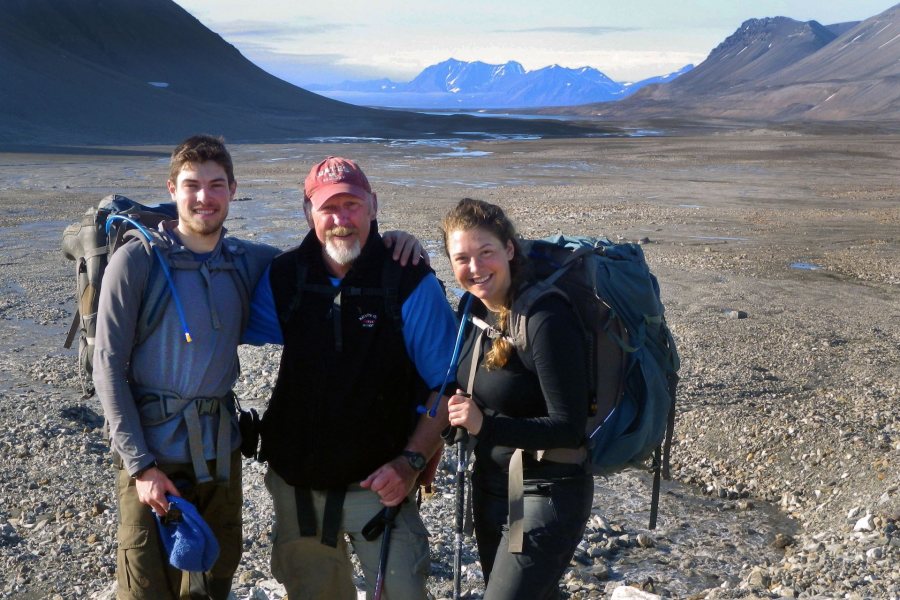
Professor of Geology Mike Retelle poses with Allie Balter ’14 and Greg de Wet ’11 at a field site in Svalbard, Norway, in 2013. (Courtesy of Greg de Wet)
Increased rainfall could have devastating effects on communities like Svalbard, Norway, which could suffer landslides and flash flooding.
According to a phys.org report, Retelle and Bradley will study lake sediments in Svalbard in order to reconstruct a long climatic history. “This will provide a unique perspective on the nature of recent sedimentary changes and provide insight into the effects of contemporary changes in climate on the hydrological regime of this region,” Retelle said.
Purposeful Work
At Bates College, new focus on ‘Purposeful Work’ — WGBH-FM
Boston public radio station WGBH-FM profiled Purposeful Work, a signature Bates program that helps students discover work that aligns with their interests and values.
The station talked to Callie Reynolds ’18, who completed a Purposeful Work internship in her Connecticut hometown in 2015; she also completed the “Life Architecture” course that teaches students how to approach the twin life goals of professional and personal fulfillment.
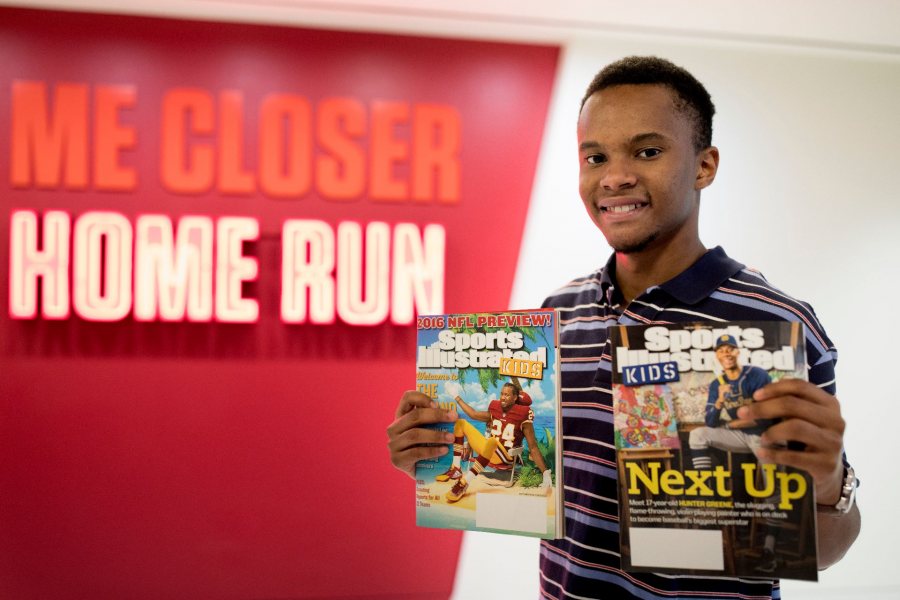
In 2017, Gerald Nelson ’18 interned at Sports Illustrated Kids as part of the Purposeful Work Internship Program. (Phyllis Graber Jensen/Bates College)
Purposeful Work, she says, “is all about figuring out what I want to do with my life.” She’s now heading to Stockholm to work for the nonprofit study-abroad foundation DIS.
Reporter Kirk Carapezza also interviewed Peter Bysshe ‘93, who was on campus during Short Term to teach a course on brand culture building, part of the Purposeful Work program that offers practitioner-taught courses on practical and applied areas of study.
“When I work with designers, I love watching them get from a stuck place to an unstuck place,” Bysshe told Carapezza. “We recognize that liberal arts students can do anything. We have them do real things so they can feel what it’s like, so it’s not just rhetoric anymore.”
Francesco Duina
Why are poor people in America so patriotic? One man went on an odyssey to find out — Salon
Chauncy Devega of Salon talked to Professor of Sociology Francesco Duina, author of Broke and Patriotic, about why the poorest Americans love their country the most.
Asked why Donald Trump won the 2016 presidential election, Duina said Trump tapped a backlash against ideas such as political correctness.
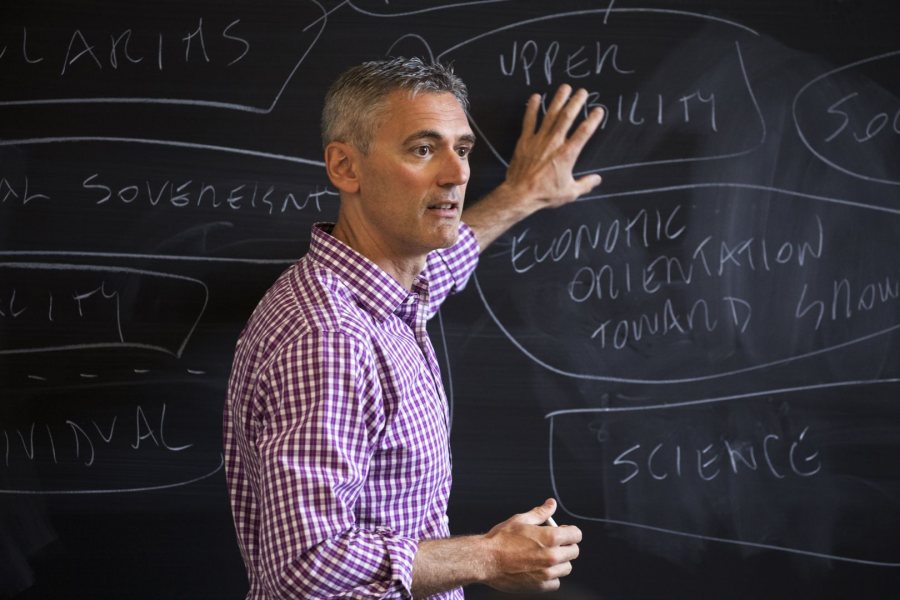
Professor of Sociology Francesco Duina teaches a course in political sociology. (Theophil Syslo/Bates College)
For Trump, political correctness amounts to collective demands for unconditional equality. For him, “this is a way of saying that these collective identities — whether it’s blacks, gays, women, etc. — demand things from the government as a matter of right,” Duina said.
Yet to Trump and his supporters, such demands are a “non-American thing,” he added, that go “against the tradition of individualism: You have certain basic rights as an individual, not as a group.
“I think the people who voted for Trump by and large could be characterized as more individualistic-oriented. They lack interest in the government providing things for them and are more interested in the government getting out of their way. His voters and other supporters also feel that the government is corrupt and catering to all sorts of people instead of them.”
Josh Macht ’91
Can tech save the humanities? — The Boston Globe
The incorporation of technology into subjects like English and philosophy could breathe new life into the humanities, writes Josh Macht ’91 for the The Boston Globe. Moreover, the increasing prevalence of technology in our society makes the humanities more necessary than ever.
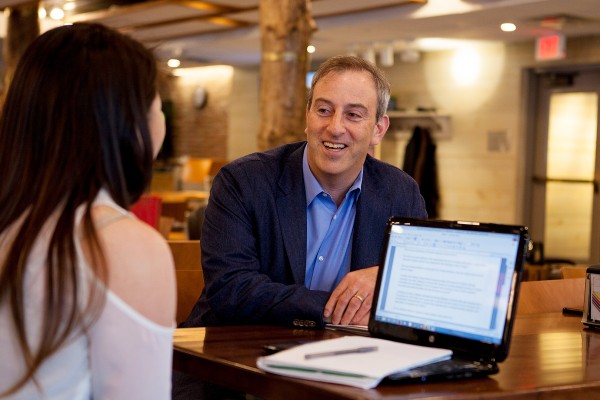
Joshua Macht ’91 talks about entrepreneurship with Shaina Lam ’17 of Portland, Maine, in 2014. (Sarah Crosby/Bates College)
Humanities and technology can intersect in promising ways, such as creating a game based on Henry Thoreau’s life or, as students in Bates’ Digital and Computational Studies program did this year, helping dancers compose music with their bodies.
“If the humanities are ever to enjoy a true resurgence, it will come as a result of a reinvention that embraces a fresh new take on old disciplines,” Macht writes.
Studying art, philosophy, or literature could also guide the development of technology. “We’ll need to develop not just the technical skills to build better tech, but also the moral and ethical reasoning to guide how society deploys them,” he writes.
Myron Beasley
Art review: Prints with a purpose – and power — Maine Sunday Telegram
In curating an exhibition of prints and posters in Portland, Maine, Myron Beasley debunked the myth that good art is “pure in itself and free from any ideological or utilitarian purpose,” writes the Maine Sunday Telegram’s Daniel Kany.
Beasley, an associate professor of African American and American cultural studies, curated “Print, Protest, Power,” exhibited at Able Baker Contemporary from May 18 to June 22. The prints and posters in the exhibition, created mainly by black artists during and after the civil rights movement, had clear messages of political action and fighting for justice.
“The works make a compelling case not only that there is much to be done, but that such efforts can and will be successful,” Kany writes. “The art builds on successes of the past as well as current topics of change politics, so when it looks to the future, it does so not desperately, but confidently.”
Nathan Lundblad
The quest to make super-cold quantum blobs in space — Wired
Wired reported on Associate Professor of Physics Nathan Lundblad’s work with the Cold Atom Laboratory, the first-ever environment that is both cold enough and free enough of gravity to create a Bose-Einstein condensate.
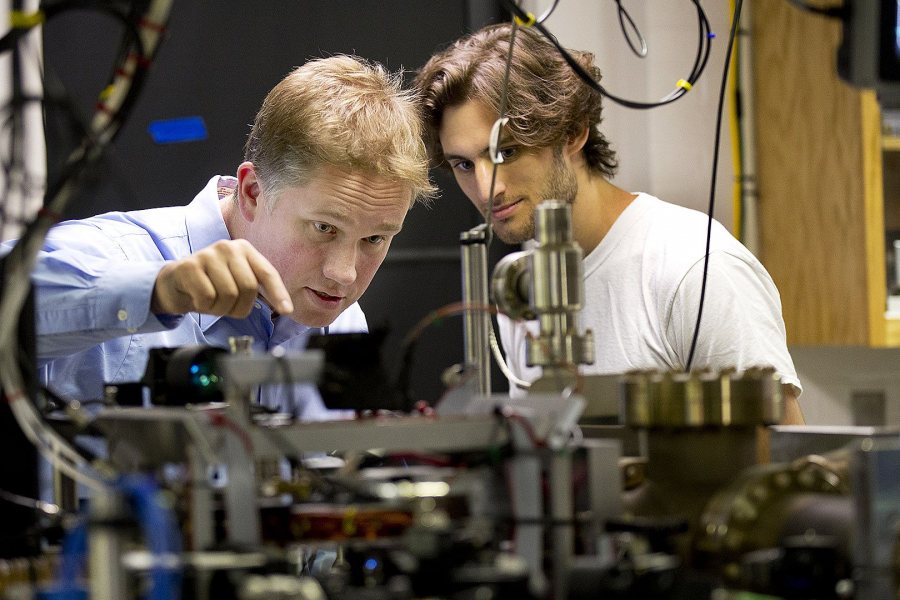
In 2014, Associate Professor of Physics Nathan Lundblad works with summer student researcher Ben Lovitz ’15 of Portland, Ore., in Lundblad’s ultra-cold atomic physics lab. (Phyllis Graber Jensen/Bates College)
The Cold Atom Lab was launched to the International Space Station in May. The “blobs” the lab creates “should yield new insights about how atoms organize themselves,” writes Sophia Chen.
Working remotely, Lundblad will study this entirely new state of matter. “Imagine you were in a culture where you’d never seen ice,” Lundblad said. “You find out that when you cool water past 32 degrees Fahrenheit, this amazing form of H2O appears that is crystalline and regular.”
Carine Warsawski ’07
A camp for Jewish connections — The Jewish Week
The Jewish Week named Carine Warsawski ’07 one of its “36 Under 36” for 2018. Warsawski is the founder of Trybal Gatherings, which creates camp-like retreats for young Jewish adults.
Though she traveled to see family frequently growing up, Warsawski told the magazine that she first felt truly connected to Judaism during a camp, and during college and afterwards she worked at camps and for student tour companies. “It became important to lead experiences that helped people connect to their Jewish culture, no matter the geography,” she said.
“Summer camps are one of the Jewish community’s greatest assets,” she added. “Trybal is an opportunity to take my own transformative experiences from camp and offer [that] to others.”
Laura Ligouri
Implicit Bias: Understanding our own beliefs — Maine Public
Weeks after a Starbucks employee called the police on two black men sitting in the store and Starbucks implemented an afternoon of anti-bias training for its employees, Lecturer in Neuroscience Laura Ligouri joined a Maine Calling panel on implicit bias.
Ligouri, the founder of a nonprofit that applies psychology and neuroscience to human rights issues, said implicit bias is an unconscious process that influences people’s preconceived ideas about others and can lead to prejudice against groups different from one’s own.
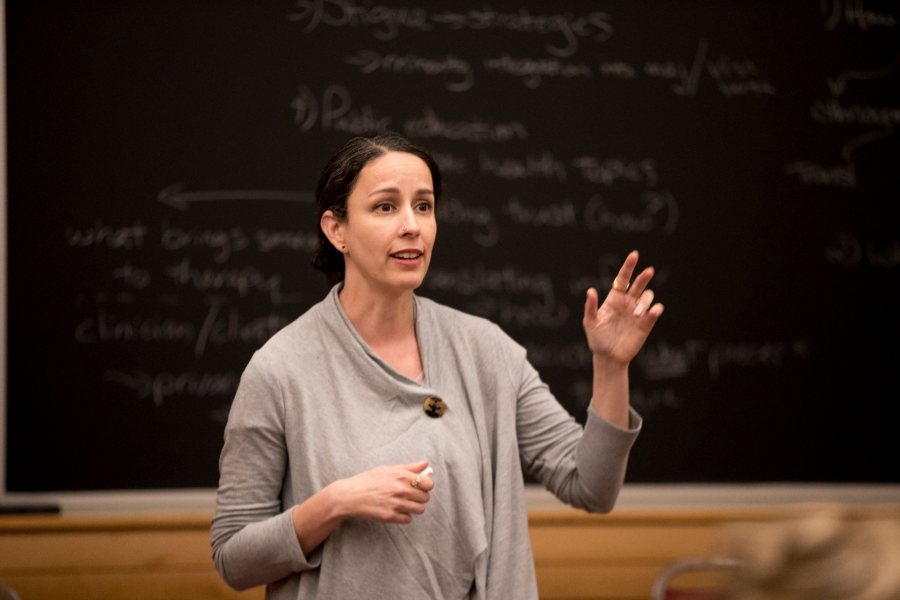
Laura Ligouri, teaches “Neuroscience, Ethics, and Society” in May. (Phyllis Graber Jensen/Bates College)
Ensuring that implicit biases don’t lead to discrimination takes more work than a few hours of training, Ligouri said — to understand and confront their biases, people must slow down and be willing to have uncomfortable conversations on an ongoing basis.
“To create change, it has to be a commitment to a program that becomes a practice,” she said.
Charles Perou ’87
Diet may influence the spread of a deadly type of breast cancer, study finds — ScienceDaily
Researchers including Charles Perou ’87 have found that blocking an amino acid found in certain foods might stop the spread of a particular type of breast cancer, the Cedars-Sinai Medical Center announced.
The team discovered that limiting asparagine — found in “dairy, whey, beef, poultry, eggs, fish, seafood, asparagus, potatoes, legumes, nuts, seeds, soy and whole grains,” according to the press release — in mice prevents the spread of triple-negative breast cancer.
The next steps are to test the effects of asparagine in healthy humans and then in cancer patients.
Perou is a leading researcher into variations of breast cancer and precision medicine. In October, he will receive the AACI Distinguished Scientist Award for his work in those fields.


